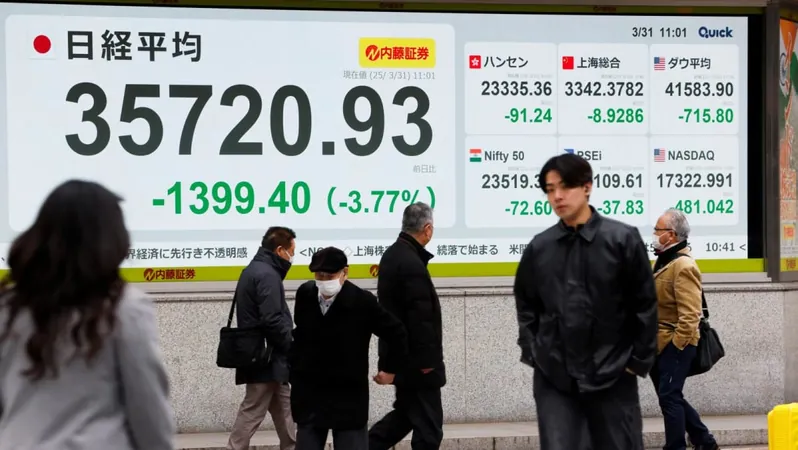
Asian Markets Take a Nosedive Ahead of Trump’s Tariff Announcement – Is A Recession Inevitable?
2025-03-31
Author: Nur
HONG KONG: Asian equity markets were sent into a tailspin on Monday
Tokyo led the charge as investors braced for a wave of tariffs poised to hit this week under the Trump administration's latest trade policy initiatives. The surge in gold prices to an all-time high, reaching an astonishing US$3,127.92, reflects rising concerns over economic stability as recession fears loom large.
President Trump's Controversial Tariffs
This turmoil comes as President Donald Trump prepares to unveil his controversial "Liberation Day" tariffs, slated for Wednesday, which are expected to impact both allies and adversaries alike. The proposed imposition of a whopping 25% duty on all vehicle imports sent shockwaves through the automotive sector, resulting in significant declines for industry giants such as Toyota, Nissan, and Mazda.
Global Reactions
Global reactions to Trump's protectionist measures have been swift. World governments are not sitting idly by; Canadian Prime Minister Mark Carney has made it clear that his country will retaliate with its own tariffs to safeguard its workforce and economic interests.
Economic Data and Federal Reserve Concerns
Adding to the anxiety, new data revealed that the Federal Reserve's preferred inflation measurement rose beyond expectations last month, raising fears that these tariffs may exacerbate inflation and derail hopes for future interest rate cuts.
Market Reactions Across Asia
On Monday, markets across Asia suffered heavy losses, particularly in Japan where the Nikkei 225 index plummeted over 4%, entering correction territory after losing more than 10% from its December peak. Zensho Holdings, a prominent player in the Japanese restaurant scene, saw its shares tumble 3.9% after a scandal involving unsanitary food practices.
Impact on Other Markets
Seoul felt the jolt as well. Economists from Moody's Analytics highlighted that the tariff hikes will hit Japan and South Korea hardest, linking nearly 6% of Japan's total exports—and 4% from South Korea—to automobile shipments to the US. Their analysis suggests that these duties could potentially slice 0.2 to 0.5 percentage points from each country's GDP growth.
Wider Selloff Dents Global Markets
The selloff extended beyond Japan and South Korea, impacting markets in Sydney, Shanghai, Wellington, Taipei, and Manila. In Hong Kong, CK Hutchison suffered a 3.2% decline amid uncertainty surrounding a multi-billion-dollar deal involving its ports operations, previously subjected to increased scrutiny from Chinese regulators.
Economic Anxieties in Thailand
Also, Bangkok's market stumbled over 1% on the heels of a recent earthquake that had already compounded existing economic anxieties. The Thai stock market has plummeted over 15% since the start of the year, signaling deepening concerns about the nation's economic health.
Global Market Sentiment
As markets in London, Paris, and Frankfurt opened lower, experts echoed a consistent sentiment: traders are now at the mercy of continuous tariff-related news and any emerging US economic data that might hint at sporadic growth or rising inflation.
Expert Commentary
Chris Weston from Pepperstone noted, "The markets are highly reactive to news related to tariffs, fostering a climate of heightened uncertainty. Investors are now glued to every piece of economic data that could suggest either a slowdown in activity or the looming threat of higher inflation."
Conclusion
As these developments unfold, analysts are keeping a close watch on how global markets will navigate potential fallout from Trump's policies and whether we are indeed on the brink of a recession. Could this be the tipping point for a global economic downturn? Only time will tell.


 Brasil (PT)
Brasil (PT)
 Canada (EN)
Canada (EN)
 Chile (ES)
Chile (ES)
 Česko (CS)
Česko (CS)
 대한민국 (KO)
대한민국 (KO)
 España (ES)
España (ES)
 France (FR)
France (FR)
 Hong Kong (EN)
Hong Kong (EN)
 Italia (IT)
Italia (IT)
 日本 (JA)
日本 (JA)
 Magyarország (HU)
Magyarország (HU)
 Norge (NO)
Norge (NO)
 Polska (PL)
Polska (PL)
 Schweiz (DE)
Schweiz (DE)
 Singapore (EN)
Singapore (EN)
 Sverige (SV)
Sverige (SV)
 Suomi (FI)
Suomi (FI)
 Türkiye (TR)
Türkiye (TR)
 الإمارات العربية المتحدة (AR)
الإمارات العربية المتحدة (AR)